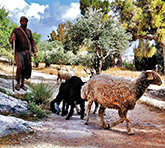×


We have detected your country as:
Please click here to go to the USA website or select another country from the dropdown list.

{image_1}Shield is a strong word, bringing to mind images of protection from threat of physical danger or bodily harm. In biblical times, a shield was the primary piece of defensive equipment used by soldiers during combat that was up close and personal. We seldom see this kind of shield in modern warfare, but the concept is still very much with us today. A shield is meant to stand between me and something that can bring me harm.
Continue Reading »
{image_1}The Bible repeatedly emphasizes the need to remember and to pass the knowledge of God and His acts to future generations.
The Hebrew word for remember is Yizkor (literally “you will remember”) and the root is z-k-r (זכר). You will also hear the word zikaron (זיכרון) which is remembrance. This root word in its various forms is found in hundreds of Scripture passages. It means to remember, recall, call to mind, to be brought to remembrance, be remembered, be thought of, be brought to mind, to mention, to record or to make a memorial, or to make remembrance.
Continue Reading »
{image_1}The Bible is filled with graphic depictions of the ways in which God communicates with His people. We are told that He calls to us, speaks as to a friend, thunders, roars, and even whispers in a still small voice. But many people are surprised to learn that He also says He whistles. The Hebrew word sharak (שרק) appears 19 times in the Bible and technically means to whistle, to hiss scornfully, or to pipe. It is sometimes translated to signal or to summon.
Continue Reading »
{image_1}We are living in tumultuous times. Natural disasters like hurricanes, tsunamis, wildfires, and earthquakes seem to be increasing in frequency. The worldwide economy is shaky. Wars and rumors of wars abound. People are desperately looking for assurance of stability, of protection, of permanence. They are looking for a place of refuge.
Continue Reading »
{image_1}Sometimes, a single word can be found to describe a current reality or even an entire period in history. Such is the case today in Israel where one word seems to be on the lips of everyone: prepare. As storm clouds gather on the horizon, much attention is being given to the concept of preparation, on virtually every level of society.
Continue Reading »
{image_1}One of the things which sets God apart from false gods is His mighty power. The Bible is replete with examples of the miracle-working power of God. One of His attributes as described theologically is omnipotence, the ability to do anything.
Continue Reading »
In this teaching letter, I would like to take a look at the fruit of the Spirit from a Hebraic point of view. Most of us read our Bibles with our own cultural understandings overlaid on the Scripture. {image_2}We are influenced by our culture, language, experiences, and nearly 2,000 years of Christian theology and tradition. I wonder, what did these words mean to the Apostle Paul?
Continue Reading »
{image_1}The word hod is one of several translated as “majesty” in the Hebrew Scriptures. It is used several times to describe and define God. He is called the majestic Lord (Isa. 33:21, NKJV), and the Bible speaks of the majesty of His Name and the majesty of His presence. I think it would benefit us to understand the word and the concept in truly biblical terms.
Continue Reading »
{image_1}Intimacy—we all want it; we all desperately need it. Some of us, however, have been so hurt in life that we fear it, or we have been so denied it that we don’t know how to pursue it. Yet, it is something we must have to survive. People commit suicide because they either lose it or can’t find it. The good news is God has the recipe for it. It’s His desire that we have it with Himself and with man.
Continue Reading »
{image_1}The second section of the book of Isaiah, sometimes called “The Book of the Consolation of Israel,” begins, “‘Comfort, yes, comfort My people!’ says your God” (Isa. 40:1). But, how does one comfort God’s people? A study of the word “comfort” will instruct us. The root form of the Hebrew word is nacham, meaning to be sorry or to be moved to compassion or pity but can also be translated as “repent or regret.” How can it be translated with words that seem so far apart in meaning to us? How can comfort be related to repentance?
Continue Reading »All logos and trademarks in this site are property of their respective owner. All other materials are property of Bridges for Peace. Copyright © 2024.
Website Site Design by J-Town Internet Services Ltd. - Based in Jerusalem and Serving the World.